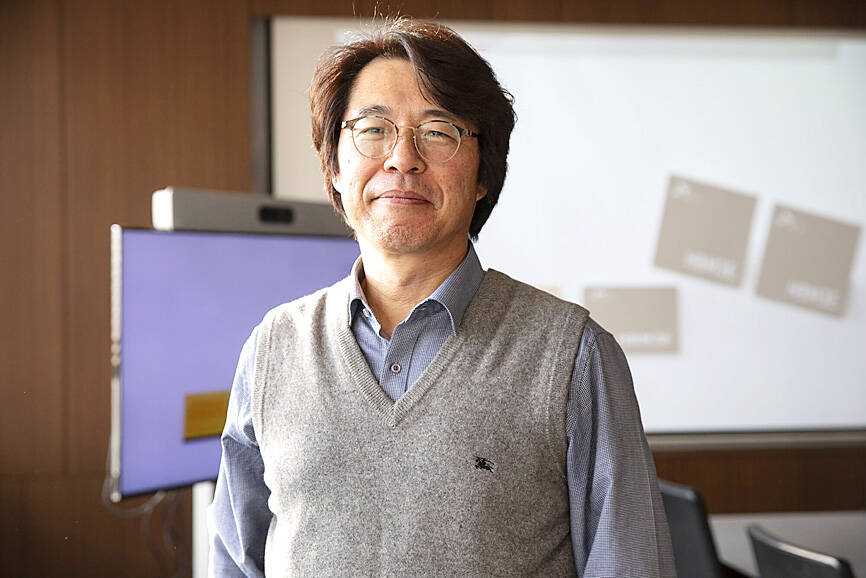SK Hynix Inc is ramping up its spending on advanced chip packaging, in hopes of capturing more of the burgeoning demand for a crucial component in artificial intelligence (AI) development: high-bandwidth memory (HBM).
The Icheon-based firm is investing more than US$1 billion in South Korea this year to expand and improve the final steps of its chip manufacture, said Lee Kang-wook, a former Samsung Electronics Co engineer who now heads up packaging development at SK Hynix.
Lee specializes in advanced ways of combining and connecting semiconductors, which has grown in importance with the advent of modern AI and its digestion of vast troves of data via parallel processing chains. While SK Hynix has not disclosed its capital expenditure budget for this year, the average analyst estimate puts the figure at 14 trillion won (US$10.5 billion). That suggests advanced packaging, which could take up a 10th of that, is a major priority.

Photo: Bloomberg
“The first 50 years of the semiconductor industry has been about the front-end,” or the design and fabrication of the chips themselves, Lee said in an interview. “But the next 50 years is going to be all about the back-end,” or packaging.
Being first to achieve the next milestone in this race could now catapult companies into industry-leading positions. SK Hynix was chosen by Nvidia Corp to provide the HBM for its standard-setting AI accelerators, pushing the South Korean firm’s value up to 119 trillion won. Its stock gained about 1 percent in Seoul on Thursday, adding to a nearly 120 percent increase since the start of last year. It is now South Korea’s second most valuable company, outperforming Samsung and US rival Micron Technology Inc.
Lee, now 55 years old, helped pioneer a novel method to packaging the third generation of the technology, HBM2E, which was quickly followed by the other two major makers. That innovation was central to SK Hynix winning Nvidia as a customer in late 2019.
HBM is a type of high-performance memory that stacks chips on top of one another and connects them with through-silicon via (TSV) technology for faster and more energy-efficient data processing.
ChatGPT’s release in November 2022 was the moment Lee had been waiting for. By that time, his team had developed a new packaging method called mass reflow-molded underfill (MR-MUF), aided by his contacts in Japan. The process, which involves injecting and then hardening liquid material between layers of silicon, improved heat dissipation and production yields. SK Hynix teamed up with Namics Corp in Japan for the material and a related patent, a person familiar with the matter said.
SK Hynix is pouring the bulk of its new investment into advancing MR-MUF and TSV technologies, Lee said.
Samsung, which has for years been distracted by a succession saga at its very top, is now fighting back. Nvidia last year gave the nod to Samsung’s HBM chips, and the Suwon-based company said on Feb. 26 that it has developed the fifth generation of the technology, HBM3E, with 12 layers of DRAM chips and the industry’s largest capacity of 36 gigabytes.
On the same day, Boise, Idaho-based Micron surprised industry watchers by saying it had begun volume production of 24GB, eight-layer HBM3E, which would be part of Nvidia’s H200 Tensor Core units shipping in the second quarter.
With its big commitment to expanding and enhancing technology at home and a multibillion-dollar advanced packaging facility planned for the US, Lee remains bullish about SK Hynix’s prospects in the face of intensifying competition. He sees the present investment as laying the groundwork to meet more demand to come with future generations of HBM.

NEW IDENTITY: Known for its software, India has expanded into hardware, with its semiconductor industry growing from US$38bn in 2023 to US$45bn to US$50bn India on Saturday inaugurated its first semiconductor assembly and test facility, a milestone in the government’s push to reduce dependence on foreign chipmakers and stake a claim in a sector dominated by China. Indian Prime Minister Narendra Modi opened US firm Micron Technology Inc’s semiconductor assembly, test and packaging unit in his home state of Gujarat, hailing the “dawn of a new era” for India’s technology ambitions. “When young Indians look back in the future, they will see this decade as the turning point in our tech future,” Modi told the event, which was broadcast on his YouTube channel. The plant would convert

‘SEISMIC SHIFT’: The researcher forecast there would be about 1.1 billion mobile shipments this year, down from 1.26 billion the prior year and erasing years of gains The global smartphone market is expected to contract 12.9 percent this year due to the unprecedented memorychip shortage, marking “a crisis like no other,” researcher International Data Corp (IDC) said. The new forecast, a dramatic revision down from earlier estimates, gives the latest accounting of the ongoing memory crunch that is affecting every corner of the electronics industry. The demand for advanced memory to power artificial intelligence (AI) tasks has drained global supply until well into next year and jeopardizes the business model of many smartphone makers. IDC forecast about 1.1 billion mobile shipments this year, down from 1.26 billion the prior

People stand in a Pokemon store in Tokyo on Thursday. One of the world highest-grossing franchises is celebrated its 30th anniversary yesterday.

Zimbabwe’s ban on raw lithium exports is forcing Chinese miners to rethink their strategy, speeding up plans to process the metal locally instead of shipping it to China’s vast rechargeable battery industry. The country is Africa’s largest lithium producer and has one of the world’s largest reserves, according to the US Geological Survey (USGS). Zimbabwe already banned the export of lithium ore in 2022 and last year announced it would halt exports of lithium concentrates from January next year. However, on Wednesday it imposed the ban with immediate effect, leaving unclear what the lithium mining sector would do in the